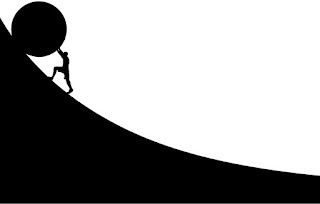"I've realised I've started to focus so much on getting a book finished recently that I forgot why I started," one friend said. "Because I enjoy writing!"
Another friend, sharing the familiar frustration of friends and family seeing her writing as a hobby commented, "But in the end it should be like a hobby. We do it because we love it."
I need to remind myself of this often. Because writing can often feel like this:
And in those time when writing feels like pushing a boulder up a never-ending hill, we wonder why we ever started this. We find ourselves writing just for the sake of reaching the top of the hill and everything until that point becomes drudgery.
I admit, I've been struggling to write this year. Still, I sat down dutifully at the computer every day with the aim of just writing something, anything. Because that's what writers, do isn't it - they write. Then last week two minor villains wandered into my draft and made me fall off my chair laughing. I raced through an entire chapter, eager to see what they'd get up to. In a matter of seconds, 'I need to write something' became 'I need to write this story.'
So I have my plan for the winter months, and I even have a few productivity tools to keep myself going. I don't use many because I find that productivity tools can become distractions in themselves, but these are the ones I've stuck with. I'm sure these are all familiar already, but I thought I'd share them in case they're helpful.
Word processor shortcuts
I've tried every writing method from notebooks and pens (too slow) to Scrivener (too organised.) I like to claw my raw material into one messy heap and then chip away at it until it looks like a story. I keep one document for the draft and one for background notes - useful for quickly checking everything from the colour of someone's hair to the customs of an alien planet.
I used to use bookmarks and comments to find my way around my draft, but now I add in scene headers and use the navigation bar, which is much more efficient. Write a brief description of your scene, go to the home tab and change the style to Heading 1. Then go to the view tab and tick the Navigation Pane box. You'll get a handy side-bar with a list of all your headings, and clicking on any of them will take you straight to it.
I've recently discovered Word's 'focus' button on the bottom right of the screen and I wish I'd known about this before. Click this and everything surrounding your words disappears. It is amazingly useful for cutting out on-screen distractions.
Go away Internet
There are many apps which will block your access to the Internet. I use Leechblock which is very easy to use - simply list the sites you want to block and when you want to block them. You can allow yourself limited access to sites, too. I am allowed 5 minutes per hour on Twitter after which I'm thrown out.
Spreadsheeting your progress
These can either be extremely useful for setting deadlines and motivating yourself to write, or ghastly things that only serve to highlight how far behind you are. I like them because they let you see how much progress you've made already.
You can find loads of templates online but I've written my own and kept them simple.
The wordcount spreadsheet lets me set a target wordcount for each day, add in my actual wordcount, then it tells me how I'm doing, many days I have left to go and my projected end date, allowing for weekends off.
You can find loads of templates online but I've written my own and kept them simple.
The wordcount spreadsheet lets me set a target wordcount for each day, add in my actual wordcount, then it tells me how I'm doing, many days I have left to go and my projected end date, allowing for weekends off.
Then I have an editing spreadsheet, which serves a practical purpose as it will help me with the structure of my novel once I've finished the first draft. I always include POV as I use multiple third person. The structural analysis column is to mark major points in the story. Once I've finished the draft, I'll spend a couple of days with this spreadsheet, seeing where material needs to be cut or moved about - which will be easy to do as all my scenes in Word are already labelled.
If you'd like the spreadsheet templates, let me know! And happy writing.
If you'd like the spreadsheet templates, let me know! And happy writing.
Claire Fayers is the author of the Accidental Pirates series, Mirror Magic and Storm Hound. Website www.clairefayers.com Twitter @clairefayers







1 comment:
Thanks, Claire, for all your suggestions.
I LOVE Navigation Panel, and was really panicking when I "lost" it after a big computer crash when a new programme - LibreOffice - was installed on my new desktop.
Eventually I found it, thank heaven. So necessary.
Post a Comment